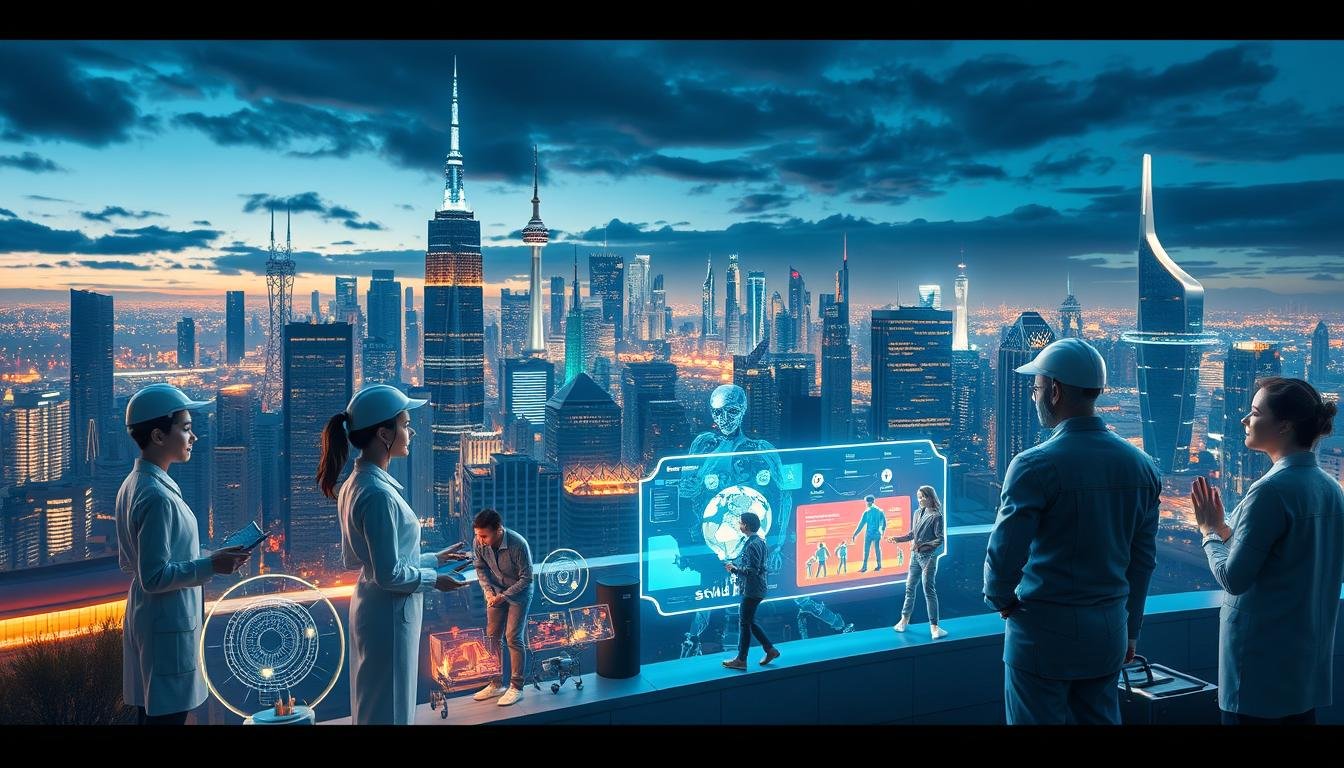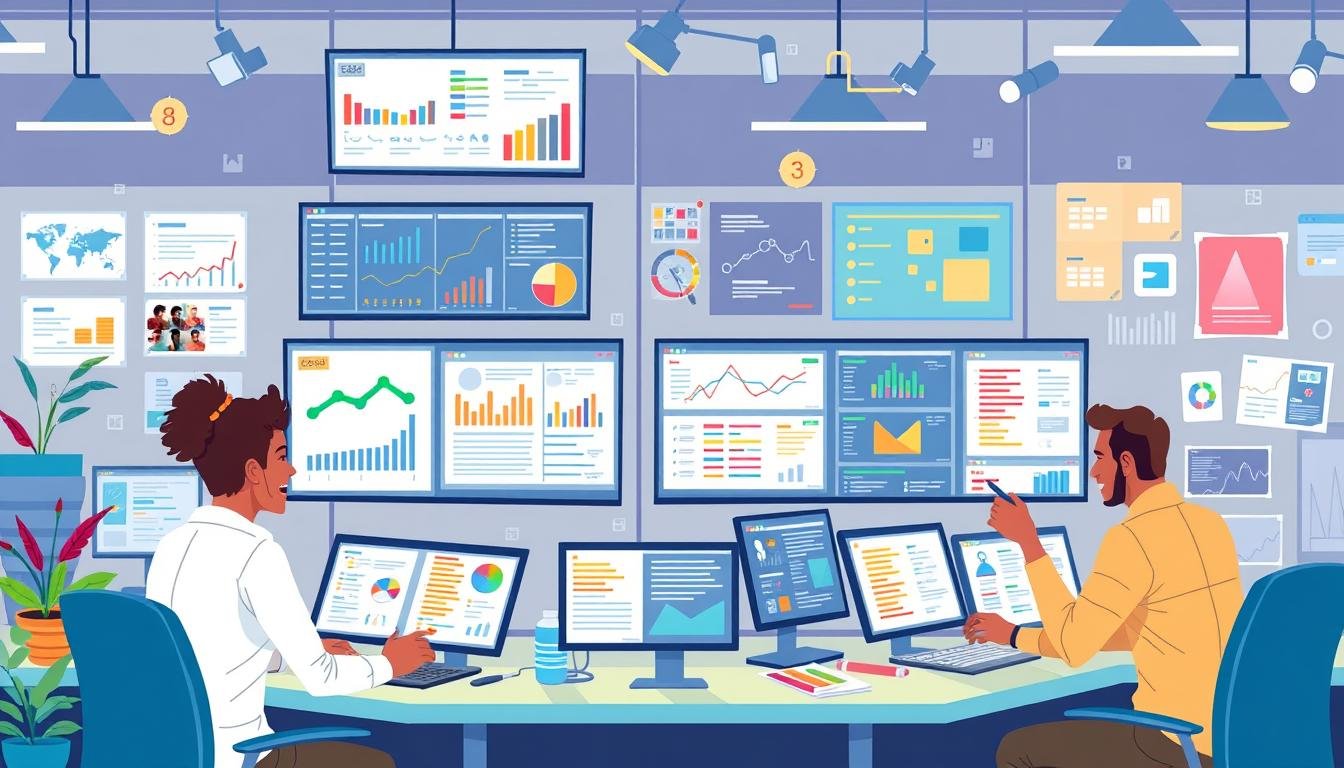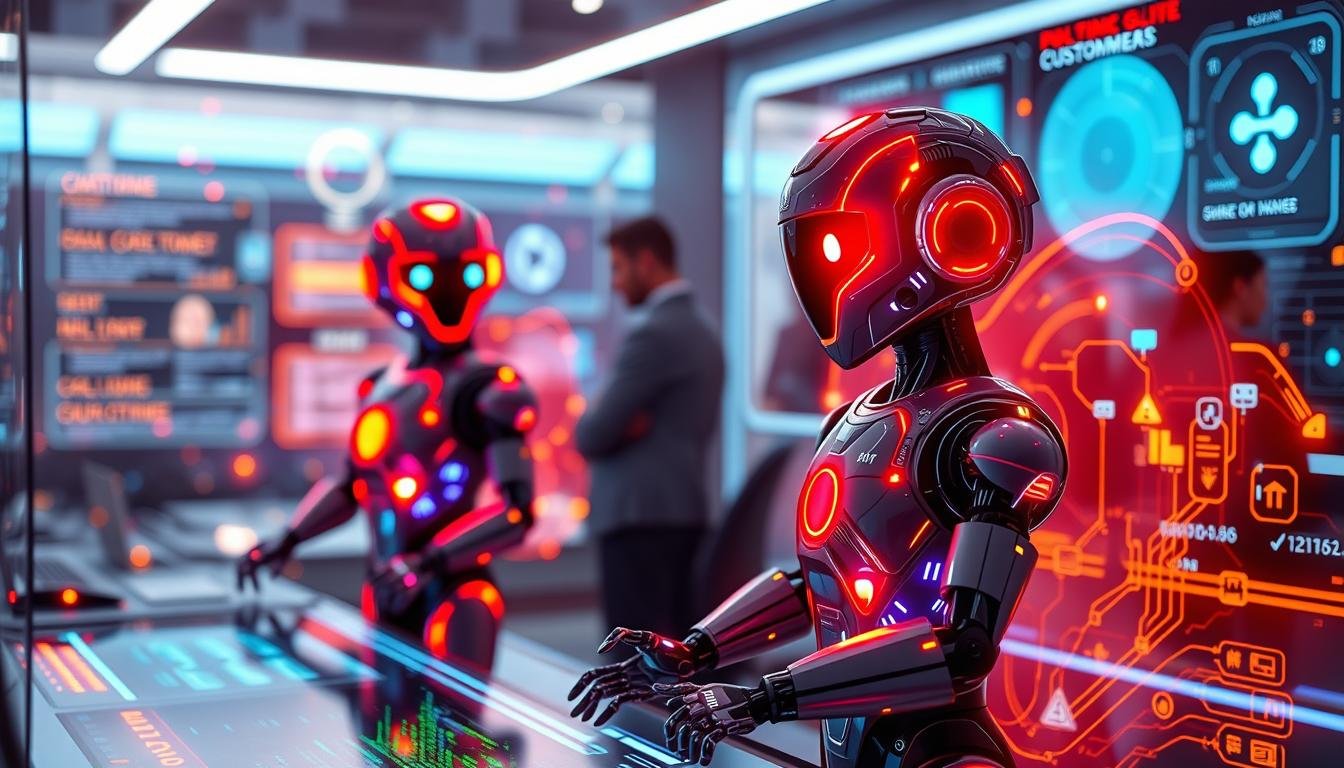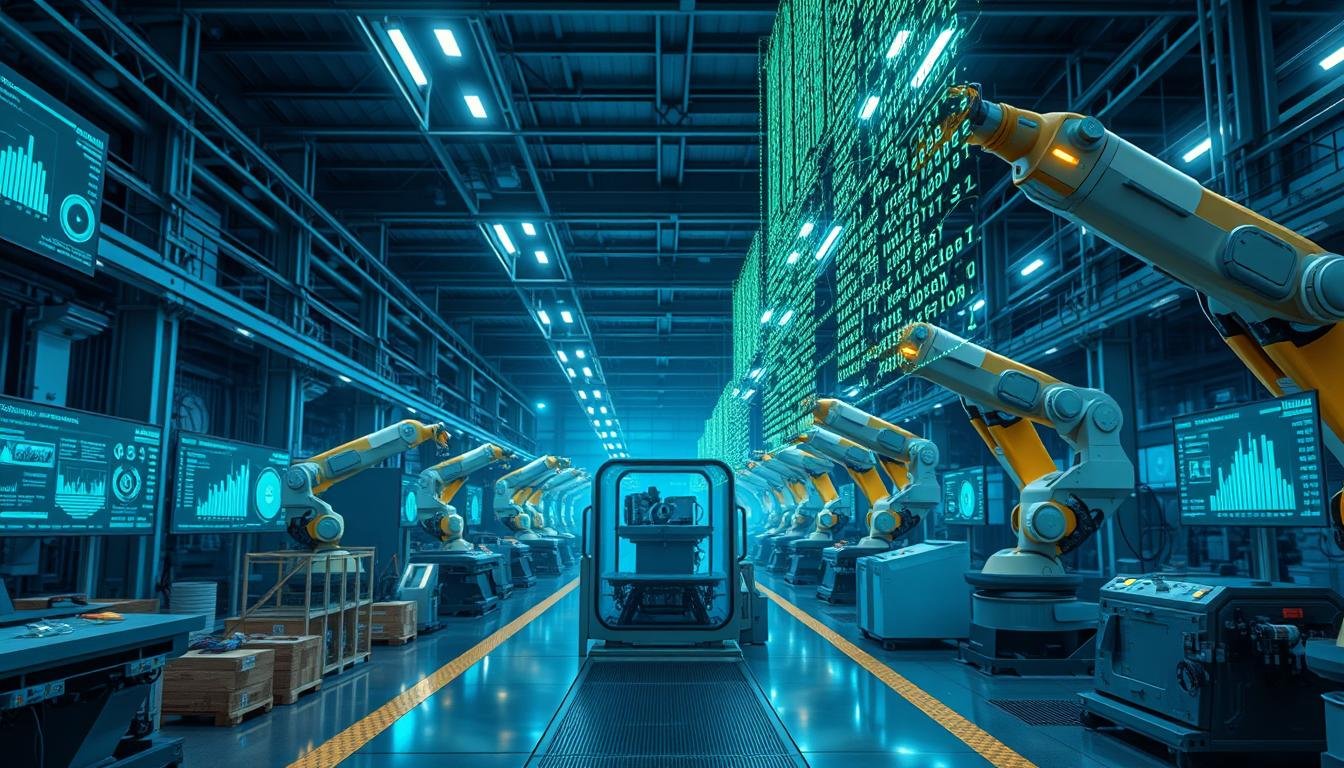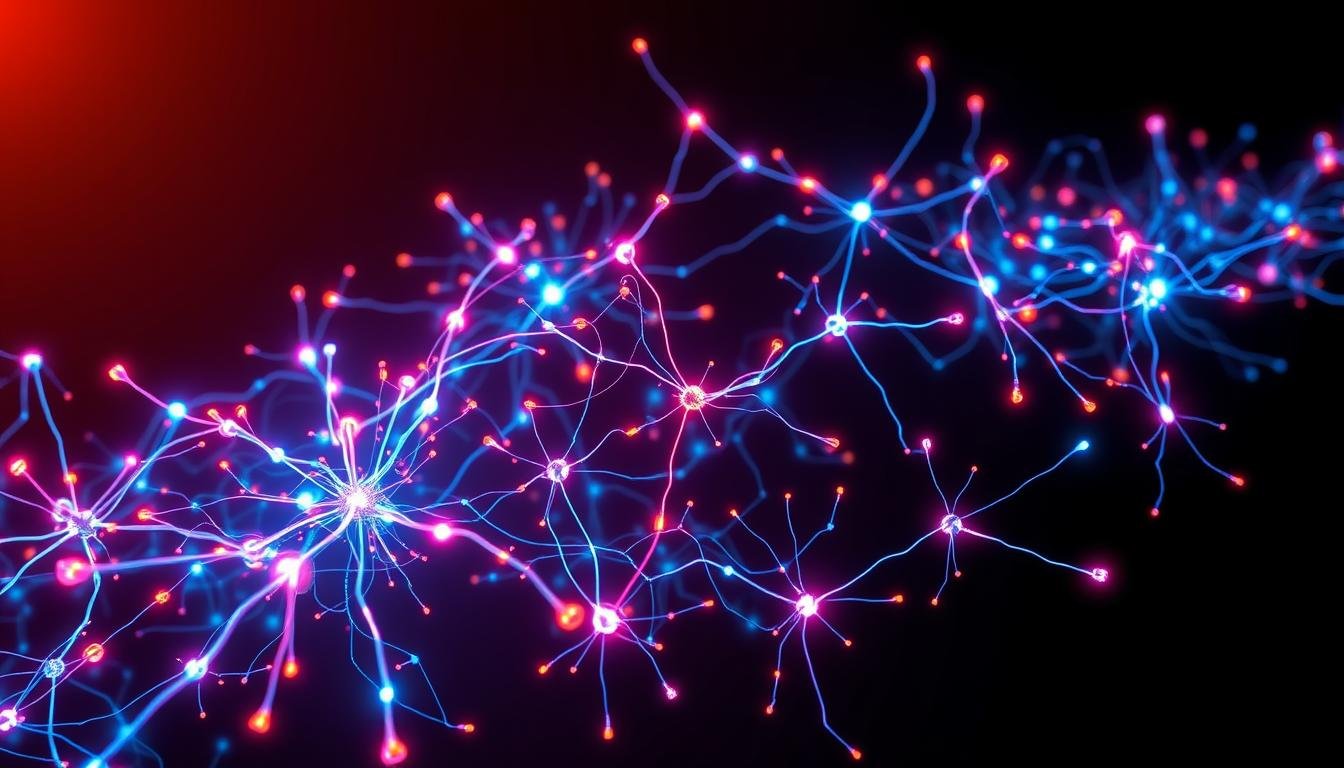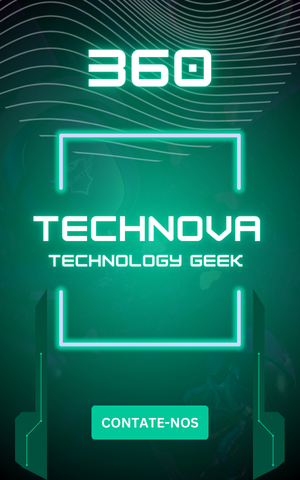The American job market is changing fast because of artificial intelligence (AI). Companies are now looking for skills over degrees. This change is because of new skills needed, tech advancements, and a changing economy.
A recent Forbes article says 88% of tech companies use skills-based hiring. This shows how AI is changing the job market. Companies are moving from fixed models to flexible ones. They focus on matching skills with the job, not just job titles.
Key Takeaways
- Jobs with routine tasks are more likely to be automated by AI.
- AI will create new jobs in programming, data analysis, and machine learning.
- Workers with skills in machine learning, natural language processing, and robotics will be sought after.
- With AI, jobs will need more creativity, problem-solving, and innovation.
- Job skill needs have changed by about 25% since 2015 and will double by 2027.
The Current State of AI in the Workplace
Artificial intelligence (AI) has changed the workplace fast, bringing more productivity and efficiency. The National Fund white paper shows AI and automation are making industries better. They boost efficiency, spark innovation, and create new jobs.
Many companies, 52%, have quickly adopted AI. By 2021, 86% of businesses will see AI as key to their success.
AI has helped workers a lot, with a 40% boost in performance for skilled ones. It has also cut down errors and accidents in dangerous jobs like mining and chemical work.
But, using AI wrong can hurt performance by 19%. This shows how important it is to use AI wisely. In healthcare, for example, new jobs like AI ethics consultants have appeared.
| AI Adoption in Business | AI-Driven Productivity | AI Integration Challenges |
|---|---|---|
| 52% of companies fast-tracked their AI strategies | Up to 40% performance improvement for skilled workers | 19% drop in performance due to misapplication |
| 86% of businesses identified AI as key to their operations by 2021 | Automation reducing margin of error and workplace accidents | Emergence of new roles like AI ethics consultants |
AI is changing the job market, but integrating it is complex. Businesses and workers must understand AI to fully benefit from this digital change.
How AI is Transforming the Job Market: Skills for the Future
Artificial intelligence (AI) is changing the job market fast. It’s creating new jobs and moving away from just looking at degrees. AI is taking over simple tasks, freeing up people to use their skills like thinking, creating, and solving problems.
Impact on Traditional Employment Models
AI is changing jobs, making some obsolete and creating new ones. For example, in banking, AI has automated simple customer service jobs. Now, there are roles like “bot trainers” who work on AI chatbots.
Emergence of New Job Categories
New jobs are coming as AI gets better. Jobs like AI ethicists, machine learning engineers, and data scientists are needed in healthcare, finance, and tech. These jobs need both technical skills and understanding of AI’s impact on society.
Shift from Degree-Based to Skills-Based Hiring
Now, skills matter more than degrees in hiring. In fact, 14 U.S. states don’t require degrees for some jobs. This change helps more people get jobs and fills the tech skills gap.
As AI changes jobs, learning new skills is key. By using AI and learning continuously, people and companies can thrive in the future.
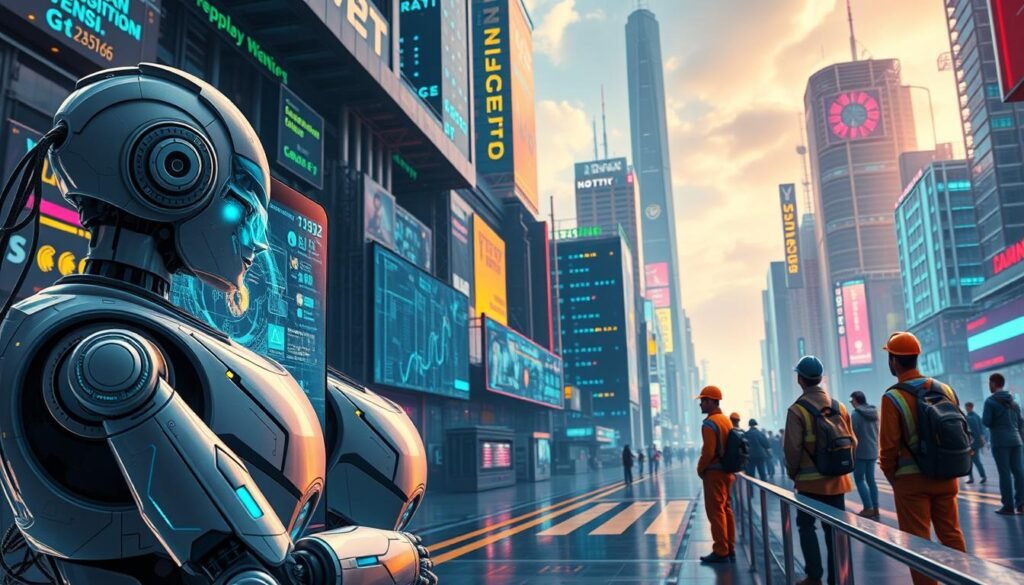
“The future of work requires a paradigm shift towards valuing skills that complement AI technology.”
AI-Driven Job Displacement and Creation
Artificial intelligence (AI) is changing the job market fast. It’s causing jobs to disappear and new ones to appear. A McKinsey Global Institute report says up to 375 million workers might need to change jobs or learn new skills by 2030. The World Economic Forum predicts AI and automation could take away 85 million jobs by 2025. But, it will also bring 97 million new roles.
AI is making some jobs obsolete, like in manufacturing, transportation, and office work. But, it’s also opening up new fields like AI development, maintenance, and working with AI. Jobs at risk include assembly line workers, basic machine operators, data entry clerks, and telemarketers. New roles are popping up in machine learning engineering, AI research, data science, and AI hardware specialization.
In healthcare, AI could add nearly 1 million jobs, says PwC’s analysis. AI is also creating jobs in manufacturing and logistics, like in robotics and predictive maintenance. This shows AI’s wide range of job creation possibilities.
| Sectors Impacted by AI Job Displacement | Emerging AI-Driven Job Opportunities |
|---|---|
|
|
As AI changes the job market, education and learning will be key. They help address fears, understand changes, and prepare workers for the future. Governments and businesses need to work together. They must support and encourage worker training and development for a skilled workforce in an AI-driven world.
“By 2025, AI is projected to displace 85 million jobs through automation, while creating 97 million new roles in the job market, reflecting a shift in the division of labor between humans, machines, and algorithms.”
Essential Skills for the AI Era
The AI revolution is changing the job market fast. To do well in this new world, you need both technical skills and soft skills. These skills must evolve quickly to keep up.
Technical Skills Development
AI has made some jobs more important. You need to know about machine learning, data analysis, and AI programming. Skills in big data, natural language processing, and AI ethics are also key.
Soft Skills in High Demand
Soft skills are just as important as technical ones. Skills like critical thinking, creativity, and emotional intelligence are hard for machines to match. They help you solve problems in new ways and work well with others.
Digital Literacy Requirements
Digital skills are needed everywhere. Knowing how AI works and how to use digital tools is vital. This knowledge helps you succeed in today’s AI-driven jobs.
| Technical Skills for AI | Soft Skills in High Demand | Digital Literacy Requirements |
|---|---|---|
|
|
|
The AI era is changing jobs fast. To do well, you need to mix technical skills with soft skills and digital literacy. This mix is crucial for success in today’s fast-changing job market.

Industries Most Impacted by AI Integration
Artificial intelligence (AI) is changing many industries. It’s changing job roles and what skills are needed. Let’s look at some industries that are feeling the biggest impact from AI:
Manufacturing and Production
In manufacturing, AI is making production lines more efficient. It’s doing tasks like assembly and checking for defects. This might mean fewer jobs for workers on the assembly line and quality inspectors.
Healthcare
Healthcare is using AI for better diagnosis and personalized treatments. AI tools might change jobs for doctors and lab workers. But, there will be more jobs for data experts and AI specialists.
Finance and Banking
Finance is using AI for checking risks and finding fraud. This change has already cut down on jobs for data entry workers. But, it’s opening up new opportunities for data scientists and AI managers.
Retail and E-commerce
Retail is using AI for managing stock and marketing to customers. While some jobs might be automated, new roles in data analysis and AI management are coming up.
Transportation and Logistics
The transportation sector is working on self-driving cars and trucks. This could mean fewer jobs for drivers. But, there will be more jobs for people who work with AI and analyze data.
Workers in these industries need to learn more about AI to keep up. They must get better at using AI to stay relevant in the job market. Training and learning new skills will be key for success in the AI world.
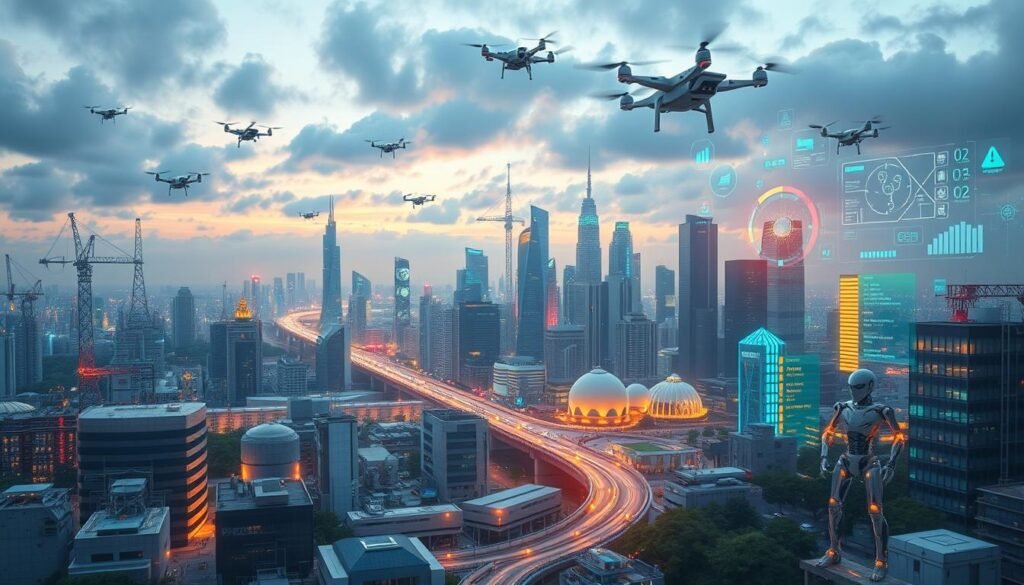
“The future of work is AI-driven, and industries must embrace this transformation to remain competitive. Adaptability and continuous learning will be key for workers to thrive in the AI-powered workplace.”
The Rise of AI-Specific Career Paths
Artificial intelligence (AI) is changing the job market fast. We’re seeing new ai career paths emerge. These include machine learning engineering, AI ethics, and governance. The need for specialized skills in AI is growing quickly.
Machine Learning Engineering
Machine learning engineering is leading this change. These roles involve designing and building new AI applications. Companies like DeepMind, OpenAI, and SambaNova Systems are leading the way. They show how crucial specialized skills in machine learning are.
AI Ethics and Governance
AI ethics careers are also becoming key. These roles focus on the moral and legal sides of AI. They ensure AI is used responsibly and fairly.
Data Science and Analytics
Data science and analytics are also vital in AI. These roles help find important insights in data. This helps organizations make better decisions and innovate. As data gets bigger and more complex, the need for skilled data scientists and analysts keeps growing.
The rise of AI-specific careers shows how AI is changing the job market. By keeping up with these changes, people can find success in the AI world of the future.
| Job Role | Average Salary Range (USD) |
|---|---|
| Machine Learning Engineer | $103,000 – $251,000 |
| Natural Language Processing (NLP) Scientist | $154,000 – $253,000 |
| Data Scientist | $77,000 – $198,000 |
| Business Intelligence (BI) Developer | $71,000 – $145,000 |
| Human-Centered Machine Learning Designer | $90,000 – $120,000 |
“The rise of AI-specific career paths underscores the transformative impact of this technology on the job market.”
Adapting to the AI-Powered Workplace
The workplace is changing fast with AI. To do well, we need to keep learning and be flexible. We must understand what AI can and can’t do. We should also focus on skills that work well with AI, not against it.
AI is taking over simple tasks, so we need more skills in solving problems, being creative, and thinking critically. Those who work well with AI tools will do great. Companies are changing how they work to make sure AI helps, not hinders, their teams.
It’s important for employees to get to know AI tools. They can make our work easier, help us make better decisions, and open up new opportunities. By knowing what AI can do, we can work better with it and boost our productivity.
To fit into the AI world, we must be proactive. We need to keep learning, be tech-savvy, and be open to change. This will help us succeed in this new era and grow our careers.
“AI will push labor markets towards extremes, automating simple tasks and increasing demand for roles involving creativity, problem-solving, and complex decision-making.”
| Occupation | AI Impact | Skill Requirement |
|---|---|---|
| Administrative Roles | High Exposure, Low Performance | Vulnerable to AI Disruption |
| Creative Professions | High Exposure, High Performance | Increased Demand for Creativity |
| Data Science and Analytics | High Exposure, High Performance | Blend of AI Expertise and Domain Knowledge |
Reskilling and Upskilling Strategies
The job market is changing fast because of AI. Now, reskilling and upskilling are key for workers to keep up. They need to learn new things to stay competitive.
Learning programs are becoming more important. They help employees get the skills for new jobs and technologies. These programs are found in companies and online.
Continuous Learning Programs
Companies are putting a lot of effort into training their workers. They offer online courses, projects, and mentorship. This helps employees learn in a way that fits their needs and the company’s goals.
Professional Development Opportunities
The need for AI skills is growing fast. This has led to more chances to learn in fields like machine learning and data science. Employers are now offering training and certifications to help their workers keep up.
Certification Pathways
Certification programs in AI and related fields are becoming more popular. They let employees show they’re up-to-date with new tech. This makes them more attractive to employers in a changing job market.
